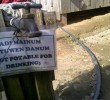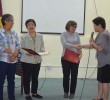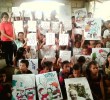April 22, 2012
NDF-Far South Mindanao Region hits plantations’ landgrabbing
In line with our commitment to defend the people and protect the environment, the NDF-FSMR expresses its utmost concern on the aggressive and unbridled expansion of the export crop industries on the rich agricultural areas of Far South Mindanao Region. This expansion is very detrimental to thousands of farmers and lumads who are losing their lands and livelihood, and as a consequence will exacerbate the food crisis we are experiencing now and especially in the years to come.
“How can we produce food when we have no land?” thus bewails a farmer from Malungon, Sarangani Province who will soon lose his cornfields to a giant agribusiness company which is putting up a 30,000 hectare castor oil and palm oil plantation in this municipality. His concern is no different from those of the peasants in South Cotabato, North Cotabato and Sultan Kudarat whose lands were taken by Dole-Stanfilco and SUMIFRU for their vastly expanding pineapple and banana plantations
At present, at least 300,000 hectares of prime agricultural lands in Mindanao are in the hands of the multinational agribusiness companies—like Dole-Stanfilco, Sumifru, Filinvest, DelMonte, Goldland Dedoro Philippines, Kenram, Cojuangco and Alcantara – producing export crops and creating billions of dollars in profit for these companies. Not content with their landholdings, these companies continue to expand aggressively, using schemes such as growership, leasehold, leaseback, Voluntary Offer to Sell, and many other forms of legal land grabbing which the state itself has provided the big comprador landlords and their imperialist masters. The military and police, the coercive instruments of the state, are also used to facilitate the smooth entry of agribusiness.
While the Filipino nation goes hungry, the agribusiness companies with the big landlord-compradors continue to produce high value crops for the imperialist nations. Included in the “land bank” of the Philippine Agribusiness Development Cooperation Center (PADCC) are some 6 million hectares allocated for the production of cash crops and two million hectares for agribusiness development. In Mindanao, the 300,000 hectares export crop plantations could have produced at least 60 million sacks of rice and corn annually! This would have been enough to feed not only Mindanao but the country’s population as well! And yet, this landlord-dominated regime has not done a single serious program to address the growing threat of rice crisis, much less to look into the plight of the Filipino farmers.
The government’s CARPer, which is nothing but lip service to agrarian reform, has further reconcentrated the lands to a few families: only 1% of the entire Philippine population still own almost 20% of the country’s total agricultural lands while 2 million farmers are left to divide another 20% among themselves.
The people’s war is a peasant war – a life and death struggle for the majority of our people to take back what is rightfully theirs – their lands and their rights. Only through a genuine land reform under the people’s democratic government shall we be able to satisfy the legitimate interest of the peasantry – the right to till the land without fear of eviction, exploitation or oppression.
Thus, on the occasion of Earth Day, NDF-FSMR reiterates its commitment to the broad masses of the people to exercise punitive measures against those “landlords with blood debts, all the human rights violators, the plunderers and operators of enterprises that ruin the environment, agriculture and livelihood of the people. The just exercise of the people’s power will continue to strengthen the revolutionary movement and weaken the ruling system.”
Furthermore, in accordance with the movement’s national policies, “…certain enterprises may be dismantled, such as those that grab land from the peasants and indigenous people, limit the land for land reform, destroy the environment and agriculture, export non-renewable resources, prevent industrialization or engage in extreme exploitation of the workers. These include plantations, mining and logging enterprises that produce for export.”
For the NDF-FSMR,
KA EFREN
Spokesperson










